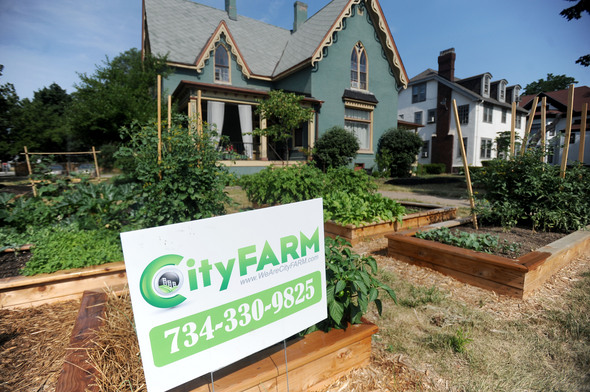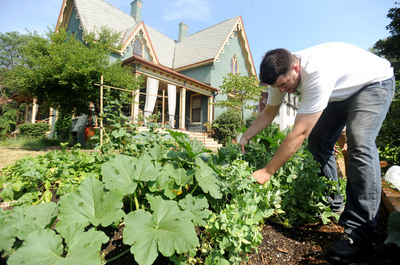Developer Stewart Beal's CityFARM company expanding operations to Detroit

A CityFARM vegetable garden at an apartment building owned by Stewart Beal on the corner of North Adams and Pearl in Ypsilanti.
Angela J. Cesere | AnnArbor.com
CityFARM is a partnership between by Ann Arbor area developer Stewart Beal and Lauren Maloney, an organic farmer who oversees the operations.
Beal said the goal was to always expand outside of Ann Arbor and the city of Ypsilanti. Beal said after they passed out fliers, the calls started coming in and people were asking questions about the business.
Beal said he became interested in expanding to Detroit because of the large volume of vacant land that could possibly be used for farming.
“We started the business in Ann Arbor but wanted to have clients in Detroit,” Beal said. Our organization has an office in Detroit and we do a lot of work there. We've just gotten our first two in Detroit and we expect to have 35 in Detroit one day as well."
"We had interest for personal gardens so we are in the process of launching an urban garden for a client in Indian Village," Beal said. "One of our long-term goals is to open a farm like the one we own in Ypsilanti in Detroit."
One of the Detroit customers is just working with the existing food-growing space, Beal said, and the other location has about 400 square feet of growing space.
In the coming months and years, CityFARM may expand even more.
"We're designing a couple of additional different phases that we're going to roll out over the winter and into the next summer," Beal said. "One of them is to have our own farm where we grow and don't donate or we sell and profit from it."

CityFARM owner and real estate developer Stewart Beal harvests peas on a CityFARM vegetable garden at an apartment building he owns on the corner of North Adams and Pearl in Ypsilanti.
Angela J. Cesere | AnnArbor.com
CityFARM began locally in January and specializes in urban farm installation at residential and commercial properties.
Since January, the company has grown and now has 20 employees, including farmers, gardeners, carpenters and mason workers.
As of July, CityFARM has more than 40 clients with project budgets ranging from $100 to $22,000. Clients include families, individuals, homeowners, renters and business corporations.
Within the first six months of operation, the company has more than $68,000 in net income and is projecting to have more than 50 clients within the first season.
When the company first began, Maloney said part of the goal was help alleviate hunger in Washtenaw County. For every raised bed installed for clients, CityFARM would install one of the same size on a demonstration farm at 103 N. Adams St. in Ypsilanti and donate the food to the local nonprofit Food Gatherers.
So far, 20 raised cedar beds in a variety of sizes have been installed for clients, and CityFARM has installed 1,000 square feet of growing space and donated 60 pounds of food.
"They're not only getting a great urban farm but they're also giving back to the community as well," Maloney said.
The business charges $32 an hour for Maloney’s services, and the four available packages run between $700 and $4,000. Beal said the company is willing to work with clients and their budgets.
“The great thing is there are upfront costs but they can be used for many, many years," Maloney said.
Maloney said people should consider installing gardens for a number of reasons.
"If you grow your own food, you know where it's coming from and you know there aren't any pesticides," she said. "You're reducing the need for chemicals. There are many benefits to it."
A lot of the business CityFARM has seen was a result of word of mouth and people walking by and noticing the farms popping up in the area.
"In the spring, we put in a large garden that was visible from the road and the neighbors that lived around it went by and said how beautiful it was and we ended up getting five clients just from that one farm," Maloney said. "People are really happy and fascinated with what we're doing."
Katrease Stafford covers the city of Ypsilanti for AnnArbor.com. Reach her at 734-623-2548 or KatreaseStafford@annarbor.com. You can also follow her on Twitter.


Comments
E. Daniel Ayres
Sun, May 5, 2013 : 8:10 p.m.
I wonder if this "experiment" will last, especially since it seems designed around taking the work started and being continually expanded by Growing Hope in the non-profit sector and "gentrifying it" for the folks that can afford to hire someone at $32.00 per hour. There are similar non profits in Detroit. What seems to make this effort look like it is getting off to a good start is "marketing." That is a good thing, but is it enough to carve out profitable niche?
shepard145
Mon, Jul 16, 2012 : 10:40 p.m.
Because it would be as much of an embarrassing waste of time in Ypsilanti as it is in Detroit. Do liberals ever ask WHY or try to figure out this bs yourselves or do you always just go with the latest fad as long as one of your heros al gore or obama gives you all the big THUMBS UP? LOL aaaaaaaYYY!
Ponddog
Mon, Jul 16, 2012 : 2:34 a.m.
It is wonderful they are going to Detroit, but what about Ypsilanti? The abandoned Ford Plant on 94 near Grove Road would be a great space for urban agriculture, including growing under lights. We need more local producer right here in Washtenaw County.
average joe
Sun, Jul 15, 2012 : 7:19 p.m.
A fair idea in concept, but looking at the numbers- $68,000 net income, 20 raised beds installed for clients, 1000 square feet of growing space, ...... and only 60 lbs of food for Food Gatherers. We used to call these garden plots, not 'farms'.
shepard145
Sun, Jul 15, 2012 : 2:54 p.m.
Redevelopment efforts of any kind will always suffer from the fact that when houses are torn down in the city, they are collapsed into basements and covered. Unless folks have the money to dig up that mess, the land is pretty USELESS. It also hard to criticize any positive work in Detroit, but the truth is that huge maga-farms are the most efficient and best way to raise food - this urban farming nonsense is a gimmick that began as a confused interpretation of the LEED credit for regional products. One of the stupidest credits, it presumes that using local products is good because they will not have to be transported by truck or train from a distant production site - an almost universally idiotic assumption. If there was a concern about getting food to Detroiters, it's the fact that not may grocers will put up with regular armed robberies and the massive shoplifting rates they would experience in the city. ....a little free advice as you feel gooders blast away: make sure you don't use any metal when constructing these farming displays....
shepard145
Mon, Jul 16, 2012 : 10:36 p.m.
I'm sure you know all about the agriculture and economics required to feed 300,000,000 people every day in the United States and have enough left over to send to 35 or so other countries! Do you know where food comes from? Do you know why there are no farms in Detroit but there are lots in other places in the US... including Michigan? ....but hey dude, maybe the Man harshed my crystals - an I borrow your foil hat to recharge their aura? Yak.
Ponddog
Mon, Jul 16, 2012 : 2:38 a.m.
Wow, I am sorry for you. Meds not working? Cheer up and learn about the food system before you throw out the negative energy.
Peter
Sun, Jul 15, 2012 : 1:40 p.m.
Meanwhile, the Thompson Block looks like the wrong end of Livernois!
Linda Peck
Sun, Jul 15, 2012 : 1:20 p.m.
Treated lumber would not be a safe product for use around crops. I do like the raised beds. Does using these raised beds mean the ground underneath would not be cleaned up of its pollutants? I don't think this is a good idea, because eventually that ground may be incorporated into the raised beds and would be a hazard.
shepard145
Sun, Jul 15, 2012 : 2:56 p.m.
Unless the beds are tiny, I would be surprised if there is an issue. Is your claim based on actual research or something you made up while typing that? LOL
Dog Guy
Sun, Jul 15, 2012 : 12:58 p.m.
Subsistence farming is Detroit's growth industry.
Bill Sloan
Sun, Jul 15, 2012 : 11:41 a.m.
Are they using raised beds to achieve soil quality consistency, because the existing soil might be contaminated in places, for bed placement flexibility, or because a lot of people have bad backs? They sure do look nice, especially in cedar rather than treated lumber. Was recycled manufactured lumber considered?